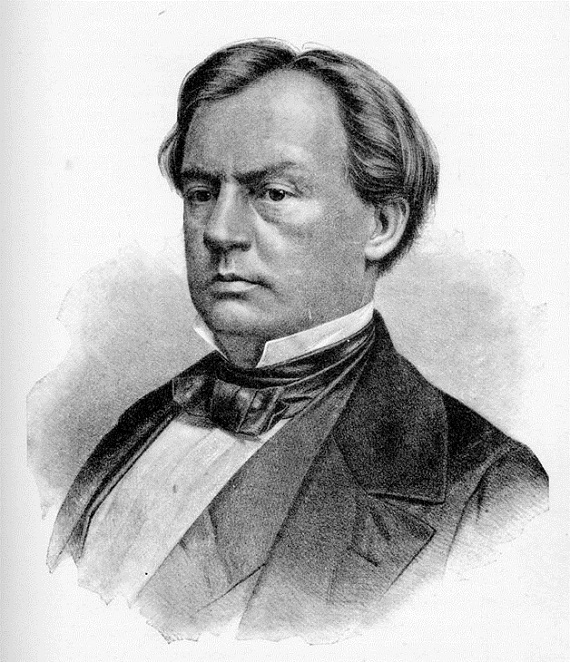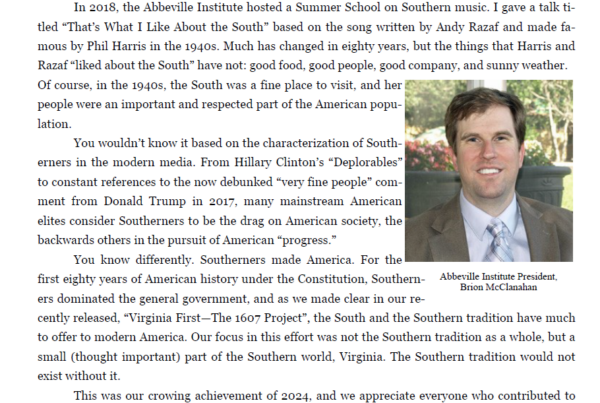From Bernard Thuersam’s website:
Senator Robert Toombs and the Cornerstone of the Confederacy
“GENTLEMEN OF THE GENERAL ASSEMBLY: I very much regret, in appearing before you at your request, to address you on the present state of the country, and the prospect before us, that I can bring you no good tidings.
We have not sought this conflict; we have sought too long to avoid it; our forbearance has been construed into weakness, our magnanimity into fear, until the vindication of our manhood, as well as the defence of our rights, is required at our hands. The door of conciliation and compromise is finally closed by our adversaries, and it remains only to us to meet the conflict with the dignity and firmness of men worthy of freedom. We need no declaration of independence.
Above eighty-four years ago our fathers won that by the sword from Great Britain, and above seventy years ago Georgia, with the twelve other confederates, as free, sovereign, and independent States, having perfect governments already in existence, for purposes and objects clearly expressed, and with powers clearly defined, erected a common agent for the attainment of these purposes by the exercise of those powers, and called this agent the United States of America.
The basis, the corner-stone of this Government, was the perfect equality of the free, sovereign, and independent States which made it. They were unequal in population, wealth, and territorial extent – they had great diversities of interests, pursuits, institutions, and laws; but they had common interests, mainly exterior, which they proposed to protect by this common agent – a constitutional united government – without in any degree subjecting their inequalities and diversities to Federal control or action.
The Executive Department of the Federal Government, for forty- eight out of the first sixty years under the present Constitution, was in the hands of Southern Presidents . . . no advantage was ever sought or obtained by them for their section of the Republic. They never sought to use a single one of the powers of the Government for the advancement of the local or peculiar interests of the South, and they all left office without leaving a single law on the statute-book where repeal would have affected injuriously a single industrial pursuit, or the business of a single human being in the South.
But on the contrary, they had acquiesced in the adoption of a policy in the highest degree beneficial to Northern interests. We can to-day open wide the history of their administrations and point with pride to every act, and challenge the world to point out a single act stained with injustice to the North, or with partiality to their own section. This is our record; let us now examine that of our confederates.
The instant the Government was organized, at the very first Congress, the Northern States evinced a general desire and purpose to use it for their own benefit, and to pervert its powers for sectional advantage, and they have steadily pursued that policy to this day. They demanded a monopoly of the business of ship-building, and got a prohibition against the sale of foreign ships to citizens of the United States, which exists to this day.
They demanded a monopoly of the coasting trade, in order to get higher freights than they could get in open competition with the carriers of the world. Congress gave it to them, and they yet hold this monopoly. And now, to-day, if a foreign vessel in Savannah offer[s] to take your rice, cotton, grain or lumber to New-York, or any other American port, for nothing, your laws prohibit it, in order that Northern ship-owners may get enhanced prices for doing your carrying.
This same shipping interest, with cormorant rapacity, have steadily burrowed their way through your legislative halls, until they have saddled the agricultural classes with a large portion of the legitimate expenses of their own business. We pay a million of dollars per annum for the lights which guide them into and out of your ports.
The North, at the very first Congress, demanded and received bounties under the name of protection, for every trade, craft, and calling which they pursue, and there is not an artisan . . . in all of the Northern or Middle States, who has not received what he calls the protection of his government on his industry to the extent of from fifteen to two hundred per cent from the year 1791 to this day. They will not strike a blow, or stretch a muscle, without bounties from the government.
No wonder they cry aloud for the glorious Union . . . by it they got their wealth; by it they levy tribute on honest labor. Thus stands the account between the North and the South. Under its . . . most favorable action . . . the treasury [is] a perpetual fertilizing stream to them and their industry, and a suction-pump to drain away our substance and parch up our lands.
They will have possession of the Federal executive with its vast power, patronage, prestige of legality, its army, its navy, and its revenue on the fourth of March next. Hitherto it has been on the side of the Constitution and the right; after the fourth of March it will be in the hands of your enemy.
What more can you get from them under this Government? You have the Constitution – you have its exposition by themselves for seventy years – you have their oaths – they have broken all these, and will break them again. They tell you everywhere, loudly and defiantly, you shall have no power, no security until you give up the right of governing yourselves according to your own will – until you submit to theirs. For this is the meaning of Mr. Lincoln’s irrepressible conflict – this is his emphatic declaration to all the world.
But we are told that secession would destroy the fairest fabric of liberty the world ever saw, and that we are the most prosperous people in the world under it. The arguments of tyranny as well as its acts, always reenact themselves. The arguments I now hear in favor of this Northern connection are identical in substance, and almost in the same words as those which were used in 1775 and 1776 to sustain the British connection. We won liberty, sovereignty, and independence by the American Revolution – we endeavored to secure and perpetuate these blessings by means of our Constitution.
We are said to be a happy and prosperous people. We have been, because we have hitherto maintained our ancient rights and liberties – we will be until we surrender them. They are in danger; come, freemen, to the rescue. Withdraw yourselves from such a confederacy; it is your right to do so – your duty to do so. As for me, I will take any place in the great conflict for rights which you may assign. I will take none in the Federal Government during Mr. Lincoln’s administration.”







